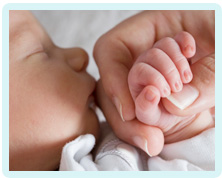
Your midwife is a vital source of support and care for you and your baby before, during and after the birth. Your first meeting with your midwife should be during the first 2 – 3 months of your pregnancy and your midwife will continue to offer support for at least 10 (and, in some areas, up to 28) days after the birth of your baby. Recent research suggested that one-to-one care by a midwife throughout labour can sometimes increase the success of a natural birth, reduce the need for a caesarean section and reduce the need for pain relief.
The Role of the Midwife
Your midwife should be a trained specialist in pregnancy and birth care with whom you will ideally form a relationship in the antenatal period (weeks leading up to the birth). She should also be trained in the care of newborn babies. Continuity of care from your midwife both during and after the birth (the postnatal period) is desirable but this may be easier to achieve if you are giving birth at home. The Royal College of Midwives issues and monitors standards of training and conduct for midwives.
During the antenatal period, your midwife should be able to provide you with information, advice and reassurance about your pregnancy and labour, and answer your questions. She will take your blood pressure, test your urine and feel your abdomen to monitor your health and the growth of the baby. She may listen to your baby’s heartbeat, take blood tests and explain other tests that you will need such as ultrasound scans.
Your midwife should always treat you with respect and honesty and provide a high standard of care at all times.
During labour, your midwife should support you and monitor the health both of yourself and your baby, responding to any concerns appropriately. She should help and advise you in becoming comfortable and coping with contractions. She will advise you on breathing. She may recommend additional actions be taken such as administering oxytocin to increase the strength of contractions, or suggest an episiotomy – a cut into the perineum to try to prevent tearing during birth. Your midwife will also be responsible for cutting the umbilical cord and removing the placenta.
If you have chosen to give birth at home, your midwife will come to assess you when you go into labour. A home birth gives you the greatest chance of continuity of care – of having the same midwife throughout the antenatal, labour and postnatal periods. If you are going into hospital for the birth, your midwife may accompany you or you may be supported by the hospital midwives.
During the postnatal period, your midwife should visit you to monitor the health of you and your baby, for up to 28 days (in some areas). She will check that your baby is growing and eating well and that you are recovering from the birth.
Recent Report Findings on the Pressures on Maternity Services
A new report – Support overdue: women’s experiences of maternity services 2017 (produced by NFWI and NCT) – has found the following worrying statistics:
- 50% of women have experienced a ‘red flag’ event during birth (see below)
- 88% of women had never met the midwife who looked after them during labour, 6% of whom said this made them feel unsafe
- 20% of women do not see a midwife as frequently as necessary after the birth, resulting in delayed diagnosis of postnatal problems for both mother and baby
- Almost 20% of women are not receiving one-to-one support from a midwife during labour
The report, based on the research into the experiences of approximately 5000 women who have given birth in the last 5 years, not only found that there is a chronic shortage of midwives, but that the situation had not improved since a similar report 4 years ago.
What is a ‘red flag’ event? – The NICE Guidelines
‘Red flag’ events are occurrences that indicate that an appropriate level of care is not being provided to the patient. The NICE guidelines suggest that the following ‘red flag’ events should alert medical practitioners to the likelihood that there are insufficient midwives available for the number of births:
- Activities that need to be done on time are delayed or cancelled.
- After giving birth, a woman has to wait for 60 minutes or more before she is washed or given stitches, if she needs them.
- A woman does not get the medicines she needs when she’s been admitted to a hospital or a midwifery-led maternity unit.
- A woman has to wait 30 minutes or more to get pain relief when she’s been admitted to a hospital maternity unit or a midwifery-led maternity unit.
- A woman who is in labour or who has a problem needing midwife care has to wait 30 minutes or more for assessment after the midwife has been alerted.
- A woman is not given a full examination when she reports she is in labour.
- There is a delay of 2 hours or more between coming in for an induction and the induction being started.
- Delays in spotting and acting on signs that the woman may have a serious health problem.
Furthermore, in guidelines issued in 2015, NICE stated that ‘ (clinical) commissioners, (NHS) trust boards and senior management should focus on the needs of each woman and baby, and ensure there are enough midwives employed to provide safe care, regardless of the time of day or the day of the week.
Maternity services should have the capacity to provide women in established labour with supportive one-to-one care. This is because birth can be associated with serious safety issues, and can help ensure that a woman has a safe experience of giving birth.’
Medical Negligence
Giving birth should be a time of joy but it can also be a time of risk for both mother and baby. If you feel you received poor care during your pregnancy or labour which has caused significant harm to yourself or your baby, please contact us to discuss your case. You may be entitled to make a claim for compensation.
Making an Enquiry
Please call us on 0800 234 3300 (or from a mobile 01275 334030) or complete our Online Enquiry Form.
Share Article With:

|

|

|

|

|

|




